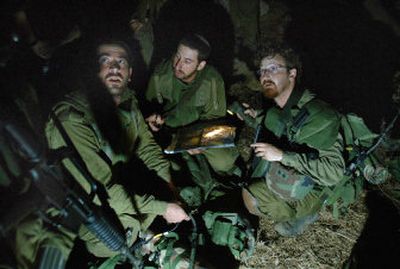Israeli offensive goes deep

BEIRUT, Lebanon – Israel poured as many as 10,000 armored troops into south Lebanon on Tuesday, and separately sent commandos deep into the eastern Bekaa Valley, where they raided a Hezbollah-run hospital and captured guerrillas during pitched battles, a major escalation of the three-week-old war.
The Israeli military confirmed the attack on the ancient city of Baalbek, about 80 miles north of Israel. It said troops, brought in by helicopter, captured an unspecified number of guerrillas and all soldiers returned unharmed. The statement gave no other details.
The Baalbek raid was the deepest ground attack in Lebanon since fighting began 21 days ago.
The ferocity of the battles in the Bekaa Valley and across southern Lebanon and the determination of the Israelis to keep fighting quelled expectations for an early cease-fire, although U.S. Secretary of State Condoleezza Rice said an agreement on how to end the conflict was possible within days.
Hezbollah’s rocket attacks into Israel, meanwhile, diminished. Hezbollah fired just 10 rockets across the border Tuesday, well below an average of about 100 a day since fighting began.
Early today, Hezbollah’s chief spokesman Hussein Rahal told the Associated Press that Israeli troops landed near the Hezbollah-run Dar al-Hikma Hospital in Baalbek, about 10 miles from Lebanon’s border with Syria.
“A group of Israeli commandos was brought to the hospital by a helicopter. They entered the hospital and are trapped inside as our fighters opened fire on them, and fierce fighting is still raging,” Rahal said early in the operation.
Hezbollah said some people had been seized at the hospital, but denied they were fighters.
“Those who were taken prisoner are citizens. It will not be long before the (Israeli) enemy will discover that they are ordinary citizens,” Hezbollah said in a statement broadcast on its Al-Manar television.
Fighting between Israeli commandos and Hezbollah guerrillas around the hospital raged for more than four hours and planes dropped flares over the city during the clashes, witnesses said.
They said at least five people were killed as Israeli warplanes staged more than 10 bombing runs around the hospital as well as on hills in east and north Baalbek where Hezbollah’s Shiite supporters live.
Witnesses said the hospital was hit in an Israeli airstrike and was burning. The fighting ended at about 4 a.m.
Residents said the Dar al-Hikma hospital is financed by an Iranian charity, the Imam Khomeini Charitable Society, which is close to Hezbollah. The hospital is also run by people close to the Shiite militant group, the residents said on condition of anonymity because of the sensitivity of the situation.
Baalbek, about 10 miles from the Syrian border, is a city with spectacular Roman ruins as well as the barracks of the Iranian Revolutionary Guards when they trained Hezbollah guerrillas there in the 1980s.
The last time Israel forces were known to have gone that far on the ground into Lebanon was in 1994, when they abducted Lebanese guerrilla leader Mustafa Dirani, hoping to use him to get information about missing Israeli airman Ron Arad. Dirani was released in a prisoner exchange 10 years later.
Hezbollah’s capture of two Israeli soldiers in a July 12 cross-border raid triggered the Israeli offensive.
In southern Lebanon on Tuesday, up to 10,000 troops in armored personnel carriers and backed by tanks were operating in Lebanon along the border zone, Israeli defense officials said. Israel called up 30,000 reservists over the weekend and thousands of them were gathering at staging areas on the Israeli side of the border, ready to join the battles.
Israel had 100,000 troops in Lebanon at the height of its 1982 invasion of Lebanon that began an 18-year occupation of the south.
Troops battled guerrillas after Israel ordered its army to go all the way to the Litani River, about 18 miles from the border.
They entered through four different points along the border and moved at least four miles inside Lebanon. Israeli officials said their soldiers were to go as far as the Litani, and hold the ground until an international peacekeeping force came ashore.
But the army later said it had distributed leaflets northeast of the river at villages where Hezbollah was active. The leaflets told people to leave, suggesting that the new offensive could take Israeli soldiers even deeper into Lebanon.
Despite mounting civilian deaths, President Bush held fast to support for Israel and was pressing for a U.N. resolution linking a cease-fire with a broader plan for peace in the Middle East.
Israeli Prime Minister Ehud Olmert said it was not in Israel’s interest to agree to an immediate cease-fire because every day of fighting weakens the guerrillas.
“Every additional day is a day that drains the strength of this cruel enemy,” he said.